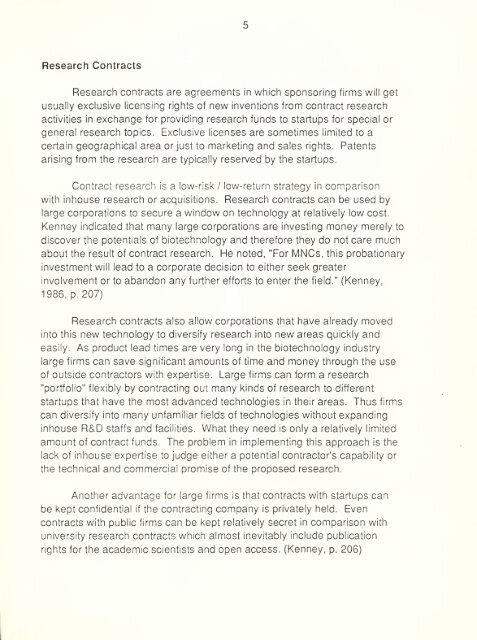Inter-firm technological collaboration : the case of Japanese ...
Inter-firm technological collaboration : the case of Japanese ...
Inter-firm technological collaboration : the case of Japanese ...
You also want an ePaper? Increase the reach of your titles
YUMPU automatically turns print PDFs into web optimized ePapers that Google loves.
Research Contracts<br />
Research contracts are agreements in which sponsoring <strong>firm</strong>s will get<br />
usually exclusive licensing rights <strong>of</strong> new inventions from contract research<br />
activities in exchange for providing research funds to startups for special or<br />
general research topics. Exclusive licenses are sometimes limited to a<br />
certain geographical area or just to marketing and sales rights. Patents<br />
arising from <strong>the</strong> research are typically reserved by <strong>the</strong> startups.<br />
Contract research is a low-risk / low-return strategy in comparison<br />
with inhouse research or acquisitions. Research contracts can be used by<br />
large corporations to secure a window on technology at relatively low cost.<br />
Kenney indicated that many large corporations are investing money merely to<br />
discover <strong>the</strong> potentials <strong>of</strong> biotechnology and <strong>the</strong>refore <strong>the</strong>y do not care much<br />
about <strong>the</strong> result <strong>of</strong> contract research. He noted, "For MNCs, this probationary<br />
investment will lead to a corporate decision to ei<strong>the</strong>r seek greater<br />
involvement or to abandon any fur<strong>the</strong>r efforts to enter <strong>the</strong> field." (Kenney,<br />
1986, p. 207)<br />
Research contracts also allow corporations that have already moved<br />
into this new technology to diversify research into new areas quickly and<br />
easily. As product lead times are very long in <strong>the</strong> biotechnology industry<br />
large <strong>firm</strong>s can save significant amounts <strong>of</strong> time and money through <strong>the</strong> use<br />
<strong>of</strong> outside contractors with expertise. Large <strong>firm</strong>s can form a research<br />
"portfolio" flexibly by contracting out many kinds <strong>of</strong> research to different<br />
startups that have <strong>the</strong> most advanced technologies in <strong>the</strong>ir areas. Thus <strong>firm</strong>s<br />
can diversify into many unfamiliar fields <strong>of</strong> technologies without expanding<br />
inhouse R&D staffs and facilities. What <strong>the</strong>y need is only a relatively limited<br />
amount <strong>of</strong> contract funds. The problem in implementing this approach is <strong>the</strong><br />
lack <strong>of</strong> inhouse expertise to judge ei<strong>the</strong>r a potential contractor's capability or<br />
<strong>the</strong> technical and commercial promise <strong>of</strong> <strong>the</strong> proposed research.<br />
Ano<strong>the</strong>r advantage for large <strong>firm</strong>s is that contracts with startups can<br />
be kept confidential if <strong>the</strong> contracting company is privately held. Even<br />
contracts with public <strong>firm</strong>s can be kept relatively secret in comparison with<br />
university research contracts which almost inevitably include publication<br />
rights for <strong>the</strong> academic scientists and open access. (Kenney, p. 206)



